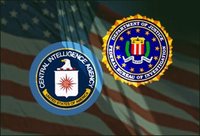 from infowars: In a twenty first century update, the new James Bond Movie, Casino Royale, directly references 9/11 and highlights the fact that massive manipulation of airline stocks prior to the attacks account for a leading motive behind the event.
from infowars: In a twenty first century update, the new James Bond Movie, Casino Royale, directly references 9/11 and highlights the fact that massive manipulation of airline stocks prior to the attacks account for a leading motive behind the event.The movie, based on the original 1953 novel, has been updated with a terrorism plotline in which the bad guy, Le Chiffre, is a banker to the world's terrorists and in order to stop him, and bring down the terrorist network, Bond must beat Le Chiffre in a $150 million poker game at the Casino Royale.
The movie contains a significant reference to 9/11 when M, the fictional head of MI6, tells Bond the following:
"When they analyzed the stock market after 9/11 the CIA discovered there had been massive shorting of airline stocks. When the stocks hit bottom on 9/12, somebody made a fortune."In the film, Bond prevents the same thing happening again with the Boeing stock, by thwarting the bombing of an airbus prototype plane at Miami airport. With their prototype destroyed the company would have been near bankruptcy. Instead, someone (we later discover it's Le Chiffre) loses over a hundred million dollars betting the wrong way as Bond foils the plot.
As has been extensively reported over the past five years, multiple sources of criminal insider trading were discovered after 9/11, indicating that many different parties had prior knowledge of the attacks.
The most significant instances of this however, and ones obviously not revealed in the Bond film, are the CIA and FBI linked cases that indicate the intelligence services, at best had prior knowledge of the attacks, and at worst were involved in their orchestration.
The London Independent among others reported that the firm used to buy many of the "put" options – where a trader, in effect, bets on a share price fall – on United Airlines stock was headed until 1998 by "Buzzy" Krongard, at the time the executive director of the CIA.
 Until 1997, Mr Krongard was chairman of Alex Brown Inc, America's oldest investment banking firm. Alex Brown was acquired by Bankers Trust, which in turn was bought by Deutsche Bank. His last post before resigning to take his senior role in the CIA was to head Bankers Trust – Alex Brown's private client business, dealing with the accounts and investments of wealthy customers around the world.
Until 1997, Mr Krongard was chairman of Alex Brown Inc, America's oldest investment banking firm. Alex Brown was acquired by Bankers Trust, which in turn was bought by Deutsche Bank. His last post before resigning to take his senior role in the CIA was to head Bankers Trust – Alex Brown's private client business, dealing with the accounts and investments of wealthy customers around the world.Other publications reported similar stories concerning FBI personnel.
On the one hand it is quite surprising to see that such a reference to the shorting of airline stocks made it into the Bond movie, primarily because the 9/11 Commission spectacularly omitted it from their investigation into the attacks.
One would think that any investigation would attempt to follow the money as it were, to trace the funding of and profits made from the attack in an attempt to discover the perpetrators. Apparently not in this case.
The Commission also failed to look into the fact that the head of the Pakistani Intelligence agency, General Mahmoud Ahmed, wired $100,000 to the lead hijacker, Mohammed Atta, in the days before 9/11. Ahmed was having breakfast on the morning of 9/11 with Porter Goss, the head of the House Intelligence Committee and the next head of the CIA.
Is the 9/11 reference a simple plot device in the Casino Royale? Is it an attempt by the script writers to further blow the whistle on the insider trading? Or is it an attempt to steam valve the information, to mix fiction with reality and thus confuse the two?
In another item of interest to Infowars readers, the film, on general release now, also features Bond being "chipped" with a tracking device in his forearm, which at one point saves his life.

No comments:
Post a Comment